
- The Italian writer died at the age of 64 from a mental stroke. Last week the editorial Pamiela published in Basque his famous essay The value of the useless. In autumn I was going to come to Pamplona to present the book.

Born in Calabria (Italy) in 1958, the writer, thinker and philosopher Nuccio Ordine has been an expert and experienced in the field of humanities and literature and, above all, has given importance to the actuarial influence of classical works. "He carries a crusade in these areas," said ARGIA collaborator Aritz Galarraga in the introductory text of the interview with Ordine. A month ago ARGIA offered a conversation between the two in number 2824.
The book manifesto L’utilità dell’inutile (“The Value of the Superfluous”) has sold one hundred thousand copies in Italy, Greece and Spain, and the editorial Pamiela published in Basque last Tuesday. Naiz collects the words of Fernando Rey, in charge of translating the book: 'The main message of the book is that we must promote what this neoliberal society considers useless, because only that will save man and society'. In autumn Ordine was going to come to Pamplona invited by Pamiela to present the book.
Illusion, publications in Basque
Ordine was excited to have the book also translated into Basque. He told ARGIA:
"Small languages, like big ones, are very important because each language is a window to understand the world; and when a language dies, that window closes. I am very proud that this book is in Basque. I don't care about the economic part, how much it's going to sell: the Basque translation, like the Galician translation, makes me feel proud because there are people who have chosen my book, saying to people: “This book is important to our culture.” For me, it's more valuable than commercial success."
"Our contemporaries are classics"
In a world where classical works seem to have no place, Ordine’s books devoted to classics have been successful. She felt a bit "incomprehensible," but above all, she said it was a "glorious failure." In fact, those texts say that "protest is a written resistance as a gesture."
I am very proud that the book appears in Basque. I don't care about the economic part, how much it will sell: the Basque translation, like the Galician translation, makes me feel proud because there are people who have chosen my book as important for that culture"
Ordine said: "Although written in the past, classics are always our contemporaries and this premise is valid for all times."
But do you read the classics or not? Do young people read? Here's what Ordine was doing.
"Young people know the classics, but the summaries that the manuals do. They don't read directly. There is a big difference between reading a summary of the Quijote or a page of the Quijote. How can a student love Quijote if he reads a summary? It's a cold, meaningless thing. Only by reading directly, with a proper teacher, you will understand that he has current messages: for example, although today one thinks that the first person to come is the only one that is worth – even if you do ethically diffuse things – said Giordano Bruno: “What really matters in life is not to arrive first, but to do it with dignity.”
.jpg)
Ordine was a university professor and made very deep readings about innovative educational programs. He worked memory and gave messages in favor of past knowledge:
"When I see educational programs, School 4.0, etc., I get upset: What does it mean that School 3.0 is useless? The Iphone 13 makes you think that the previous twelve Iphone are not worth, which have become obsolete, is an idea of programmed obsolescence. Why is this not good for the new? It is no coincidence that in the Greek world memory is the mother of all knowledge, that new knowledge is children of memory. Today we have no interest in history, because we are a world programmed to make money, we look only at the future, at the end product of technology. The impulse for consumption is enormous and young people are programmed consumers, in school, in university... We don't educate educated and critical citizens, we generate passive consumers, little solders who think only about making money, who prioritize success."